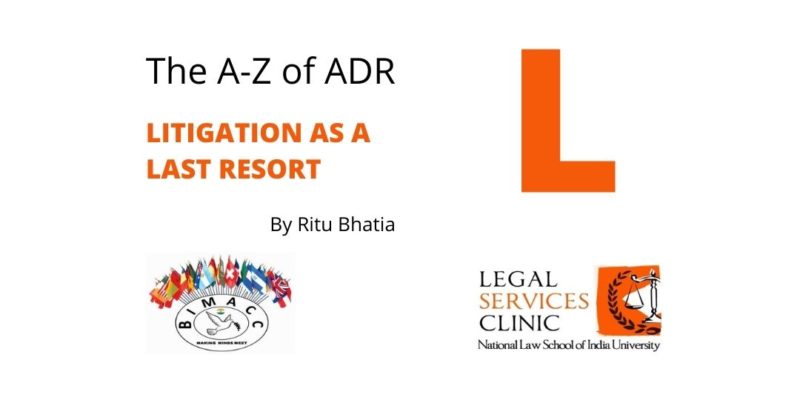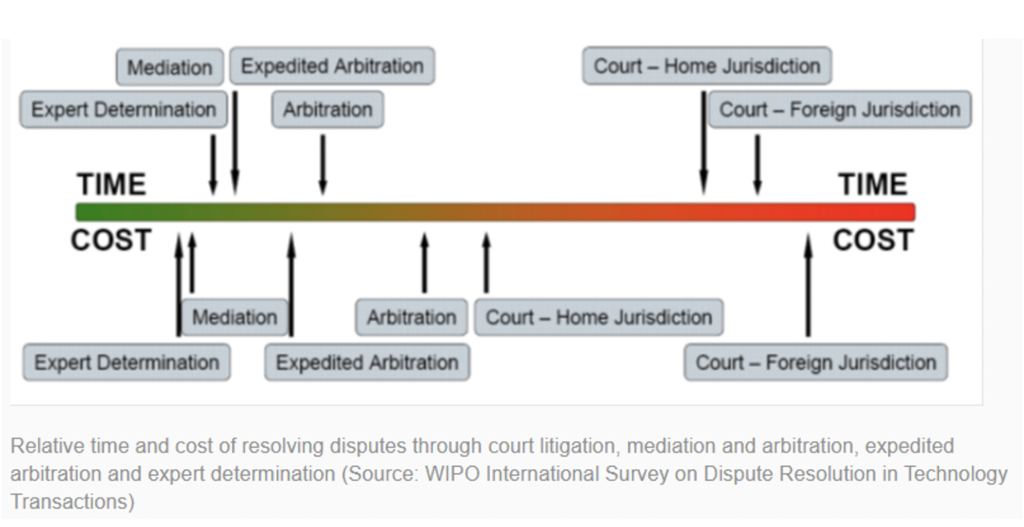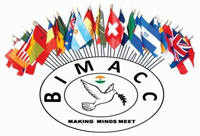
A-Z of ADR: LITIGATION AS A LAST RESORT
-Ritu Bhatia (II Year, NLSIU Bangalore)
ADR stands for Alternative Dispute Resolution and includes dispute resolution procedures like Mediation, Conciliation, Arbitration, etc. It includes processes and techniques where the parties at dispute come together and reach a settlement that is a win-win situation for the parties.[1] This method of dispute resolution is not new but has been followed for a very long time. In the past few decades, companies have adopted ADR methods in consumer and commercial disputes. Before proceeding as to why ADR is better than Litigation and why Litigation should be considered as a last resort, let us understand what they mean.
Litigation: This is a formal and public process of dispute resolution which involves dispute resolution in a courtroom with a judge or jury. Litigation is subject to the formal and strict rule of proceedings.[2]
There are many forms of dispute resolution under ADR. They are mentioned as follows:
- Arbitration: In Arbitration, parties come together with a neutral third party, who after hearing both the sides makes a final and binding decision.
- Mediation: In Mediation, there is also a neutral party who merely facilitates the negotiation and helps the parties to come to an amicable solution. He does not impose a binding award on the parties.
- Negotiation: Negotiation is a form of communication between two or more parties to come at a mutually agreeable solution. In Negotiation, the parties usually represent themselves or may have counsels to represent them.
- Conciliation: It is similar to mediation but differs from mediation in certain aspects. In conciliation, the conciliators can make a proposal for settlement at any stage of the proceedings. Thus, unlike a mediator, a conciliator has a more pro-active role in the proceedings.[3]
ADR methods of dispute resolution are better than Litigation. ADR methods have unique features and several advantages over Litigation, they are as follows-
SIMPLE PROCEDURE
Dispute resolution in Litigation is based on the adversarial judicial system, that is it depends on facts and evidence of the case. The adversarial system makes the process of litigation lengthy and complicated. The Court frequently issues orders and delays the proceeding to get evidence.[4] ADR is neither based on the Law of Evidence nor on the adversarial judicial system.
In ADR, the parties at dispute can belong to a different jurisdiction and settle the dispute at a single forum. This avoids the complexity and costs that occur in case of multiple jurisdictions in Litigation. Adopting a single forum in ADR methods also mitigates the risk of having inconsistent outcomes.
AUTONOMY AND FLEXIBILITY
Dispute resolution in ADR revolves around the principle of negotiations, diplomacy, deliberations and discussions. ADR methods allow the parties to enjoy a great amount of autonomy, which Litigation lacks. Parties have the freedom to set the terms governing the settlement. Parties have control over the process of dispute resolution, can select a neutral person for their choice to facilitate the settlement, choose the law applicable, language and place of proceedings, etc.[5] Further, they can decide the date and time of the process based on their work schedule.
Litigation, on the other hand, follows a uniform set of procedure and gives no room for autonomy for the parties at dispute. Unlike ADR, in litigation, the entire process is under the control of the judge. In India, the practice of Arbitration falls under the Arbitration and Conciliation Act, 1996 and is not subject to following the procedures in the Civil Procedure Code.[6]
EXPERTISE KNOWLEDGE
The parties have the full autonomy to appoint the mediators or experts for dispute resolution. These mediators have specialized knowledge and experience in that area of law. This facilitates high-quality outcomes in limited time and at low costs.[7] In litigation, the courts are already overburdened with cases and thus, fail to pay attention to the nuances of a particular case. However, the experts in ADR pay complete attention to the facts and this makes ADR more efficient and effective. [8]

CONFIDENTIALITY
The proceedings and settlement in ADR are kept extremely confidential. This resolves the concerns of both the parties regarding their image in the outside world. This is tremendously important for the Companies and Corporate houses, as their trade secrets and reputations are at stake. In Litigation, the proceedings are a public affair as the court exercises the right to an audience. This is devastating for certain clients as it drastically affects their reputation.
Mediation especially takes care of the privacy and autonomy of the parties. In meditation, the appointed mediators have the option to ask parties if they wish to enter a private caucus if the party seems reluctant or hesitant to reveal their confidential information. A private caucus is a private session between the mediator and one of the parties, to ensure that the information is secured and protected.[10]
TIME AND COST
Litigation is known to be a lengthy and complicated procedure. In the majority of the cases, it takes decades for a case to ultimately reach its conclusion and offer justice. In certain cases, the case gets so stretched that when it is finally decided, one party may have died. However, ADR serves justice to the parties within a short span of time because the process is case-specific.
ADR is usually cost-effective and quick, compared to multi-jurisdictional proceedings. On the other hand, litigation is time-consuming and expensive.[11] The costs incurred in litigation includes the court fees, travel charges, the fees of the counsel, notary charges, etc. The costs incurred increases as the duration of the suit stretches.
FINALITY AND CERTAINTY
In Arbitration, the settlement of the dispute is final and binding. The awards granted in ADR methods are final and have limited room for further appeals after completion of the process. Since the award granted is binding, it is highly unlikely that the party will go against.[12] In Litigation, the person has the right to move from the Trial Court to the Supreme Court, this creates uncertainty with respect to the awards granted by the court. This also extends and makes litigation a lengthy process.
Based on the above discussion, one can without a doubt say that ADR is better than Litigation. ADR is cost-efficient, speedy, confidential, flexible, simple, etc. ADR also offers different forms of dispute resolution and parties can pick one that satisfies their needs. Thus, it is concluded that Litigation should be considered as a Last Resort dispute resolution mechanism. ADR should be the first preference due to its multiple advantageous over Litigation.
[1] Avishikta Chattopadhyay, ‘Introduction to Arbitration and Conciliation Act’ (Legal Bites, 1 Oct 2019) <https://www.legalbites.in/introduction-arbitration-conciliation-act/> accessed 28 June 2020.
[2] ibid
[3] Rajkumar Dubey, ‘Alternate Dispute Resolution’ (Mondaq, 5 August 2004) < https://www.mondaq.com/india/corporatecommercial-law/27733/alternate-dispute-resolution-an-overview> accessed 28 June 2020.
[4] ibid.
[5] Avishikta Chattopadyay, ’13 Reasons why ADR is better than Litigation’ (Legal Bites, 5 Aug 2019) <https://www.legalbites.in/13-reasons-why-adr-is-better-than-litigation/> accessed 28 June 2020.
[6] ibid.
[7] ibid.
[8] Heike Wollgast, ‘WIPO Alternative Dispute Resolution’ (WIPO, Nov 2016) <https://www.wipo.int/wipo_magazine/en/2016/si/article_0010.html> accessed 28 June 2020.
[9] ibid.
[10] Avishikta [1].
[11] Rajkumar [3].
[12] Heike [8].
-Ritu Bhatia (II Year, NLSIU Bangalore)
Ritu Bhatia is a second-year student from the National Law School of India University (NLSIU), Bangalore.
BIMACC expresses its gratitude towards the author and to the members of the Legal Services Clinic, National Law School of India University (NLSIU) for their support in our collaborative efforts to promote ADR with this series titled “A-Z of ADR”. The purpose of this series is to increase the understanding of certain fundamental concepts of Alternative Dispute Resolution.
The Legal Services Clinic is a student-run committee that provides free legal services to the socially and the economically backward sections of the society who have difficulty accessing the judicial system. It also has a mandate of spreading legal awareness and providing free legal assistance to those who cannot afford it.
Website: www.legalservicesclinic.org/
Facebook: @legalservicesclinic
Email: lsc.nlsiu@gmail.com
Phone Number: 073586 73214
Disclaimer: The views and opinions expressed in this blog are those of the author and do not necessarily reflect the official policy or position of BIMACC, any of the members of the Board, or the empanelled neutrals. This blog is for informative purpose only and does not constitute legal advice in any manner whatsoever.
